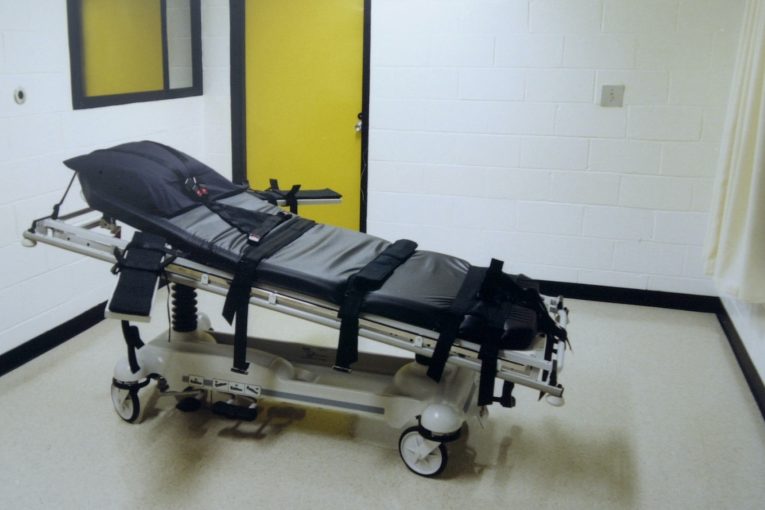

By Ayanna Gandhi
Navajo Nation President Jonathan Nez has made a personal appeal to Pres. Donald Trump, asking that he commute the sentence of Lezmond Mitchell, who is the only Native American set to be executed.
In a recent letter, Nez and Vice President Myron Lizer called on the American president to “demonstrate respect for the Navajo Nation’s tribal sovereignty by commuting Mr. Mitchell’s sentence to life imprisonment with no possibility of release.” They hope that the new letter will show that Mitchell’s commutation would honor “Our Religious and Traditional Beliefs.”
Nez pointed to the tribe’s “steadfast opposition to Mr. Mitchell’s execution in light of the tribe’s long-standing position on the death penalty for Native Americans, noting, “The United States Department of Justice sought the death penalty against Mr. Mitchell despite the Navajo Nation’s public opposition, against the express wishes of the victim’s family, and ostensibly against the recommendation of the U.S. Attorney for the District of Arizona.
“The Navajo Nation is respectfully requesting a commutation of the death sentence and the imposition of a life sentence for Mr. Mitchell. This request honors our religious and traditional beliefs, the Navajo Nation’s long-standing position on the death penalty for Native Americans, and our respect for the decision of the victim’s family…We need to address this issue to move forward in our  trust of our federal partners and to continue to work on the importance of protecting our People,” the letter stated.
trust of our federal partners and to continue to work on the importance of protecting our People,” the letter stated.
Mitchell’s clemency petition, filed on July 31, 2010, similarly urges President Trump to respect the longstanding opposition to his death sentence from the Navajo Nation, as well as the family of his victims.” Clemency petition here: https://tinyurl.com/y6rdgqwo
The clemency petition highlights how Mr. Mitchell’s case involves an “unprecedented overreach by federal authorities to usurp tribal sovereignty and represents the only time the federal government has pursued a death sentence against a Native American person over tribal opposition.”
In the petition, for context, it states, “An amendment to federal law that Congress passed in 1994 requires the government to obtain tribal consent for a capital prosecution for a murder on tribal land. In 2001, Mr. Mitchell, then age 20, and a juvenile co-defendant, both Navajo, killed two other Navajo people on land within the Navajo reservation. The Navajo Nation wrote to the government to oppose a capital prosecution, explaining that “Navajo cultural and religious values . . . do not support the concept of capital punishment.”
The clemency petition also explains, “Members of the victims’ family also opposed seeking a death sentence against Mr. Mitchell, later explaining with profound grace the view that we do not need another murder (execution of Lezmond Mitchell) for our family to heal or feel better. In light of the tribe’s and victims’ opposition, the local U.S. Attorney’s office in Arizona then recommended against a capital prosecution.”
However, the petition further argues that “the federal government obtained a death sentence against Mr. Mitchell anyway. It did so by exploiting a loophole in the law, charging him not with murder – which would have required tribal consent – but with carjacking resulting in death, a federal crime of general jurisdiction that does not depend on the crime being committed on tribal land and does not require tribal consent for the government to seek a death sentence.”
The clemency petition quotes law professor Addie Rolnick, who explains, “Whether or not it was technically legal, the Attorney General’s decision to seek the death penalty [for Mr. Mitchell] against the tribe’s wishes for a crime committed by one Indian against another within tribal territory contradicts clear federal policy – in effect since 1968 and amplified since 2000 – in favor of strengthening tribal justice systems and limiting federal infringement on tribal sovereignty…three Ninth Circuit judges have all concluded that this case warrants careful clemency consideration, going as far as to ‘hope that the Executive will carefully consider whether the death penalty is appropriate in this unusual case.’”
The petition adds, “Mr. Mitchell asks the President to take into account important mitigation evidence that his jury had no opportunity to consider. Mr. Mitchell’s trial lawyers failed to investigate and present to the jury evidence of his traumatic childhood in a household rife with abuse and addiction. Nor did the jury hear available evidence that at the time of the crime, Mr. Mitchell – who had no prior criminal history – had been awake for days drinking and doing drugs in a binge that likely induced psychosis. His juvenile co-defendant, who had previously committed other murders and was the primary assailant in this crime, was legally ineligible for the death penalty and does not face execution.”
The petition ends by saying, “President Trump can correct this infringement on tribal sovereignty – and redress the victims’ family’s feeling that their views were ignored and disrespected…by commuting Mr. Mitchell’s death sentence to one of life imprisonment without possibility of release.”
To sign up for our new newsletter – Everyday Injustice – https://tinyurl.com/yyultcf9

Given all the arguments, this should be granted.